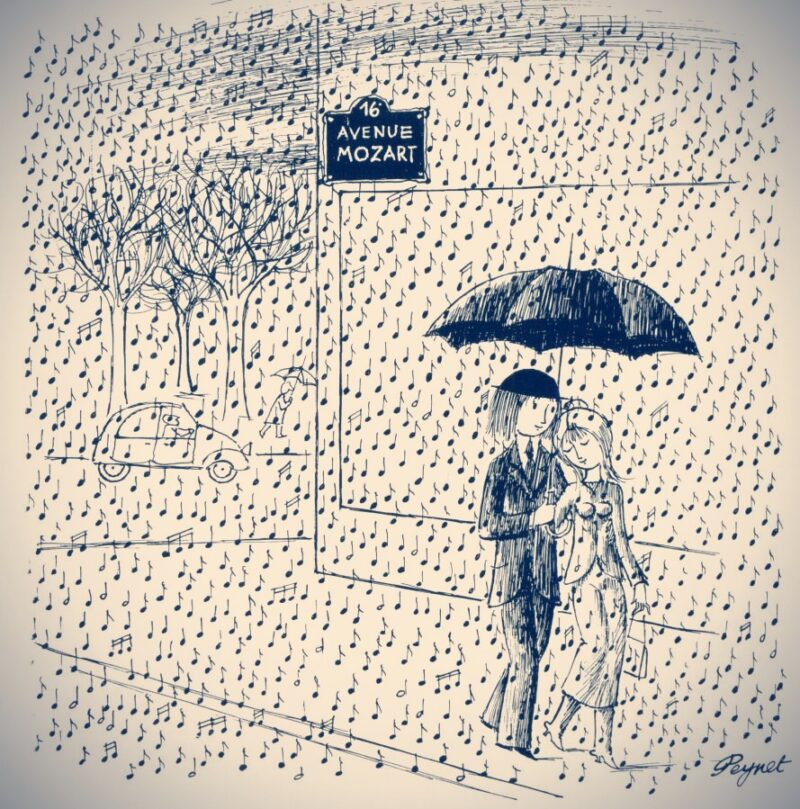it is a serious thing
just to be alive
on this fresh morning
– Mary Oliver, An Invitation
They sit, young and gazing, doe-eyed and cliché, into each other, oblivious of the world, entangled, on a public bench. He is tall, adolescent thin, wearing a bowler hat and suit clearly not bought for him, or in this era. Long poet’s hair. Hers is in a loose, bouncing ponytail tied with a ribbon. Little hat, little purse, modest knee-length dress, little waist.
Flowers, maybe. Birds, somewhere. Perhaps a Sunday. An old-fashioned snapshot of first love, à la Belle-Epoque, on a piece of paper.
First love: paper. Paper lovers. On French postcards, stamps, schoolbooks, vintage posters, old books on the quais of the Seine, the yellowing pages of 1960s Paris Match, Elle…holding hands, hopelessly naïve, on a bench in La La Land—
in Valence actually, in 1942 Vichy France.
Raymond Peynet was sitting alone, on that bench, broken and broke, in charge of a family, in exile from a German-occupied Paris. A cartoonist in a war. No one wanted cartoons in a war. Early morning. And light, filtered, silvery, was just breaking.
It fell on a bandstand. There was no band. He drew in a violinist, tall and lanky, in a borrowed, tired suit, like his. A hat. Then he drew a girl, in fine pencil lines and billowy dress, listening to the music he played in his head.
Les amoureux qui s’bécotent sur les bancs publics,
Bancs publics, bancs publics,
“The lovers kissing on public benches…” There were no lovers on benches. There were young people marching angrily all over Europe. There was a war, and even before it, Peynet had been mocked for being, like his work, too romantic, “gentil,” too… unrealistic.
People did not hold hands in real life, spread dainty picnics of baguettes and a few cheeses on every patch of grass in Paris; walk, kissing under the same umbrella, on Avenue Mozart, in the rain. Not in France, not anywhere, not in war or peace; there was no time or place for free-floating vignettes of love,
as if such a way of being “were opposed to living, were a dream…”
Peynet drew another sketch. And another, and another. His lovers took shape. He sent them to an editor in a shattered Paris after Liberation.
Lovers on a bench, a bicycle, a stroll, their wedding day. There was no story line, pithy joke, commercial viability. The editor bought them and asked for more. Les Amoureux de Peynet would become the emblem of country’s post-war re-definition:
France is for lovers, and alive, and free, and liberated. The couple appeared everywhere—newspapers, magazines, biscuit tins, perfume bottles, jewelry—and by 1953, were an anthem to which George Brassens gave words and a melody:
Les gens qui voient de travers
Pensent que les bancs verts…
“Those who can’t see properly think that the green sidewalk benches are made for the impotent or lazy,” Mais c’est une absurdité, car,
“in truth, they are there to welcome, for a while, love beginnings.” Les amoureux qui s’bécotent sur les bancs publics…
se tiennent par la main, parlent du lendemain, du papier bleu d’azur
Que revêtiront les murs de leur chambre à coucher
Ils se voient déjà doucement elle cousant, lui fumant dans un bien-être sûr
Et choisissent les prénoms de leur premier bébé
Les amoureux…
To say Peynet taught France to love again would be… unrealistic. Every Valentine’s Day, the state issues Amoureux stamps and lottery tickets. The public bench and bandstand in Valence are historical landmarks. And in 1987, the Ordre des Arts et des Lettres made Raymond Peynet Commander.
“He was a very loveable man, who spent his whole life talking about love,” and kept drawing lovers until his wife’s death, three years before he followed.
There are books and movies, documentaries, four museums devoted to Les Amoureux, and many statues, including one in Hiroshima, Japan, at the Atomic Bomb Memorial:
He brings her hand to his chest. She smiles, “as if to declare to the world, See how happy I am,” except her world—her immense, whole world, as alive and free and real as love—is in that young man in an old-fashioned hat, on a bench, a piece of paper.

